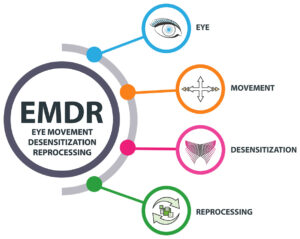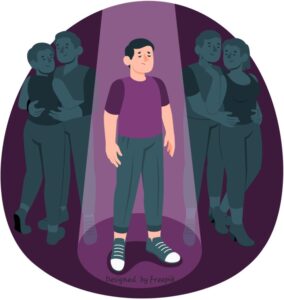A break-up is the end of a romantic or platonic relationship. The person going through a breakup experiences a plethora of emotions and empty, hurt, lonely, angry are just the tip of the emotional iceberg; the wreckage caused by the breakup runs far too deep. Breakups can leave a broken individual with a bruised self-image and wrapped in a blanket of insecurity. Heartbreak caused by a break-up is not only for the loss of a partner but also for an imagined future, certainty, and a chunk of themselves as well.
Many people seek out an instant fix to the heartbreak by completely distracting themselves from it. This only provides a short period of relief by numbing the pain for a while, but it doesn’t solve the problem in any way. Moving on from a close connection is incredibly tough and one can experience a wide range of difficult feelings, complicated and intrusive thoughts, and obsessive behavior patterns, which can hamper an individual’s and sometimes their ex-partner’s social and work life. Break-ups have a negative effect on both the professional and personal life of the individual as they can often squander one’s self-esteem & self-image.
If you are having trouble moving on from your past relationship and a certain level of difficulty with adjusting to your daily routine, you should seek break-up counseling. In break-up counseling, a mental health specialist helps you cope with your emotional loss and damage done by the break-up.
Dealing with a break-up:
Relationships are a significant part of everyone’s life, and it is extremely necessary that we acknowledge their importance in our life and the pain and sadness that accompany their loss, in order to move on. When it comes to healing from a break up there are several caveats to look out for like numbing emotions through alcohol, drugs and rebound relationships, and sex. Some people might indulge in binge eating, rash driving, overworking themselves in order to gain short relief and distraction from the situation at hand.
Many make the mistake of thinking that emotional numbness is equivalent to healing. It is natural to flee from facing the pain and seeking temporary relief overburden of experiencing pain, but it only further delays the healing.
It is utterly unrealistic to expect the end of meaningful and often long relationships to blow over a short period of time and eventually lay forgotten. It is very natural to be triggered while encountering places and things that remind you of the person.
Social Psychological & Personality Science published a study that found out that discussing a breakup and looking at it from a different perspective is often helpful. Reflecting on the situation objectively may help regain a sense of self, which in turn may make it easier to move on. Focusing and building oneself after a breakup may be helpful and ease the recovery process.
Staying active, avoiding potentially harmful behaviors such as excessive drinking or drug use, and accepting support and care from people close to you or a counselor are all likely to benefit healing and improve one’s outlook.
How Therapy Helps:
Experiencing a breakup can lead to stress, anxiety, and depression among many individuals especially if the relationship that ended was a serious one. At the end of a relationship, a person might be sad, empty, angry, and often confused. Breakups are a common cause of situational depression and can sometimes lead to suicidal tendencies. This inner turmoil is often also felt by the partner who wanted or initiated the breakup.
When a breakup causes overwhelming feelings that are difficult to cope with, interferes with an individual’s ability to cope with day-to-day routines. A therapist or counselors tend to be a supportive and helpful part of the healing process and moving on; particularly when conditions such as depression, grief, or post-traumatic stress develop (PTSD) in certain individuals post break up.
Therapists and other mental health professionals help individuals work through the unresolved feelings they might have post-breakup. Therapy helps individuals discuss any emotions or difficulties experienced by them as well as help them explore ways to cope with the negative feelings.
Therapeutic Approaches:
Therapists often use psychotherapy which is a use of psychological methods, particularly through regular interactions, to help the patient accept and overcome the problems faced by them. Psychotherapy advocates and acts on the following therapeutic approaches :
- Express the pain. Many might not be comfortable expressing the pain that they are experiencing. Therapy helps them acknowledge and express it in a constructive manner.
- Find stability in emotional chaos. Emotional losses leave people feeling all over the place. Therapy helps gather those pieces of themselves and be more stable in the situation at hand.
- Grieve the loss. Emotional losses are as devastating as physical ones and one must be able to grieve that loss in order to move on.
- Seek answers to questions. Break-ups often leave people questioning their self-worth and outlook on relationships. Therapy helps these people to put things into perspective. Questions like “ Why me?” or “ Why did this happen?” are given a holistic view and answered in a proper and reassuring manner.
- Gain closure. The closure is accepting one’s fate and being okay with it. It’s often gained by receiving the answers to all the devastating questions that arise from the breakup and a therapist does just that.
- Catharsis is the venting out of strong emotions and feelings that have been troubling the individuals. An individual might find it easier to vent to a therapist than to friends or family.
- Dealing With Overthinking. The end of a relationship forces one to think and overanalyze the situation in order to point out the actions or moments that led to this situation. It can lead us to believe how that our actions could’ve altered the situation. A therapist helps put things into a perspective and allows you to come to terms with the break-up without falling into the damaging pool of overthinking and unknowingly slipping into a vicious cycle of self-blame or self-criticizing; that restricts us from seeing the flip side of the coin.
- Rebuilding Self. The key to moving on is rebuilding your sense of self. When you’re habituated to a person’s presence in your daily life, it becomes challenging and lives the days without them. We tend to see ourselves as part of that person rather than as a unique individual on our own. Without them, we may end up feeling lost and lonely. Rebuilding our identity and sense of self sans this person is the final phase of the healing process.
If you feel lost or miserable after a break up you should seek help in order to not let the situation escalate or systematically deal with the emotional loss. With the increase in technology, you can find your therapist online as well as in-person just by looking up the therapists near you.
Feel free to reach out to us for counseling and psychotherapy sessions from our trained psychologists, and psychotherapists.




